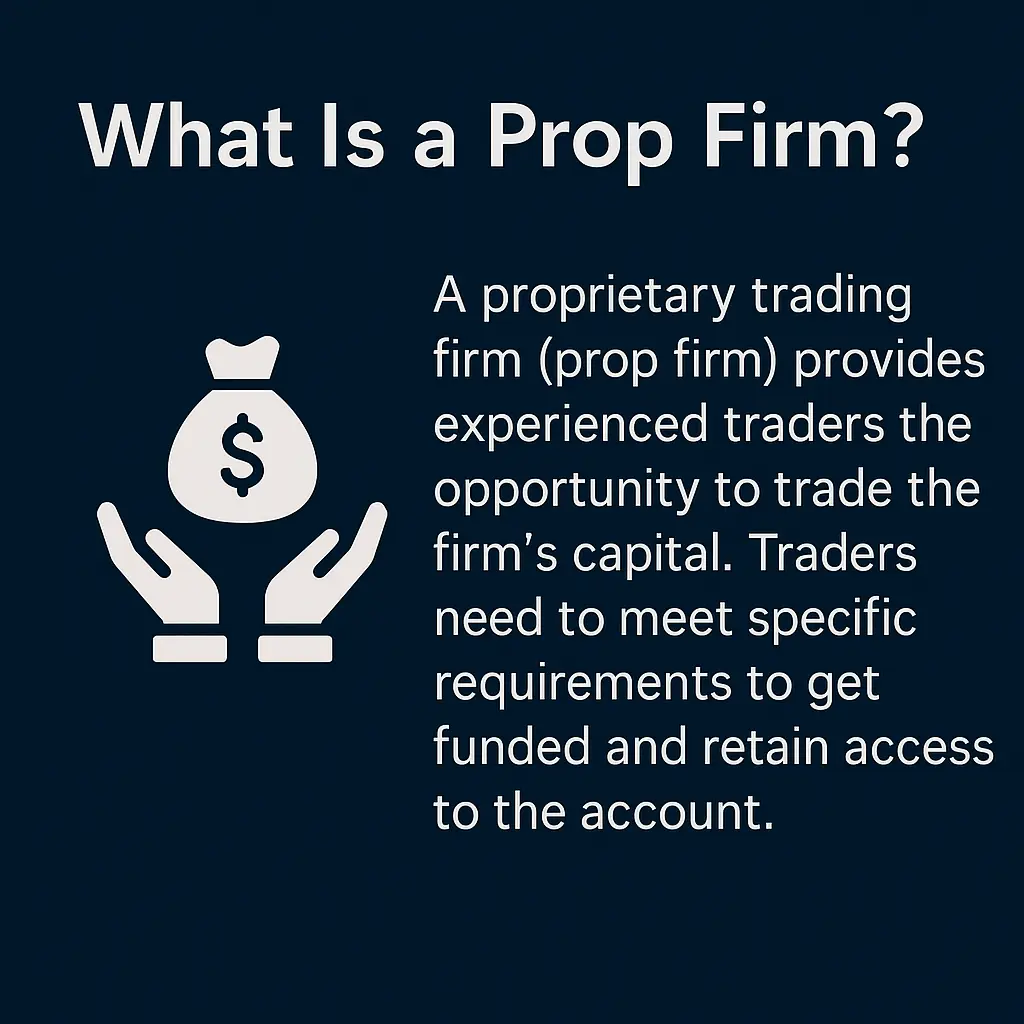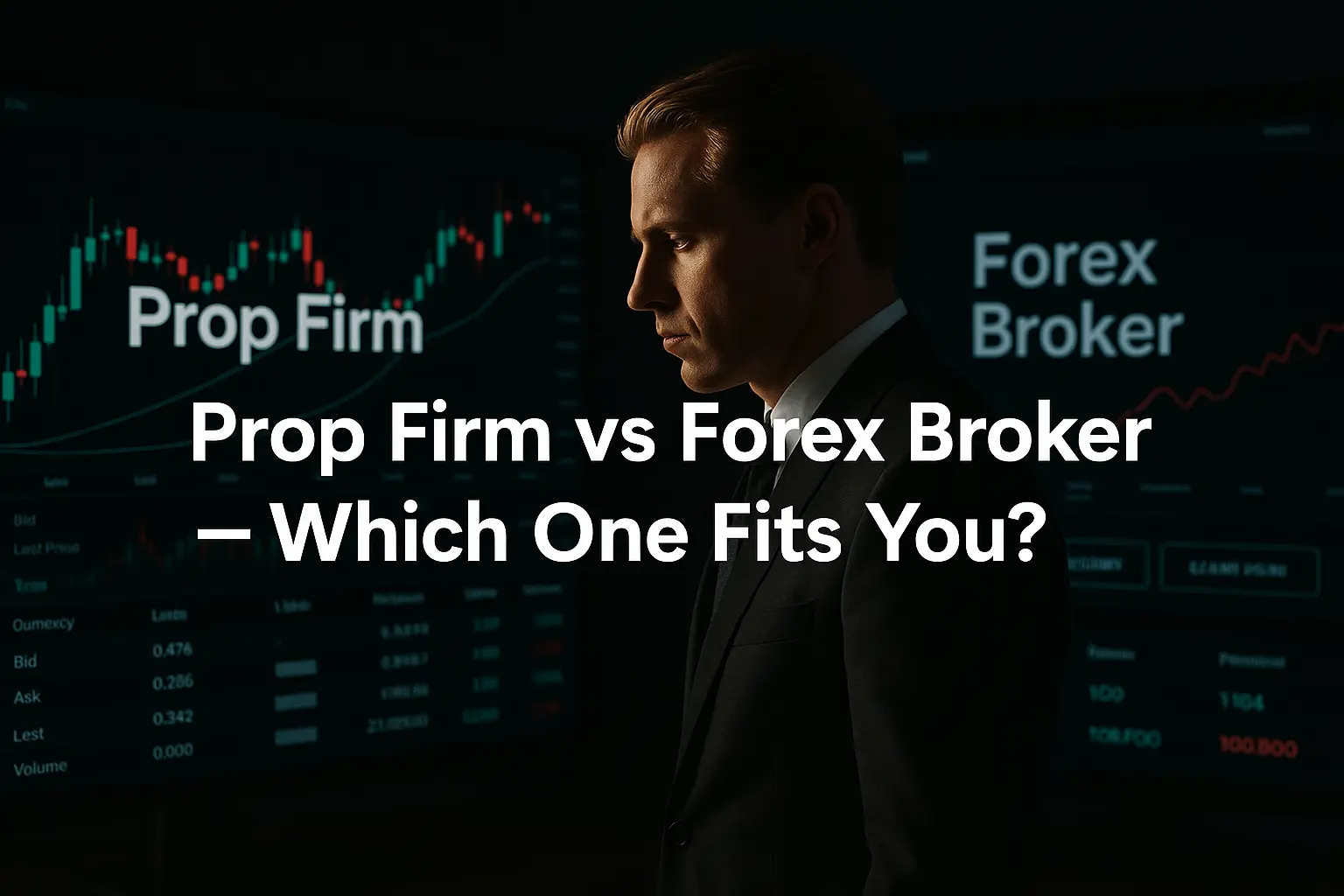Discover which trading model fits your goals — compare prop firms and forex brokers side by side.
✅ What Is a Prop Firm?

A prop firm (short for proprietary trading firm) allows traders to trade using the firm’s money instead of their own. If you’re a skilled trader but lack large capital, a prop firm can offer a path to trade with funded accounts — sometimes up to $200,000 or more.
To gain access, traders must pass a challenge or evaluation phase, proving their consistency, risk control, and profitability. Once funded, traders earn a profit split, commonly 70–90%, while following strict trading rules.
Key benefits of prop trading firms:
- You don’t need to deposit large capital.
- Losses are absorbed by the firm, not the trader.
- You earn a profit split on successful trades.
- It’s ideal for disciplined traders with limited funds.
However, prop firms also enforce tight risk limits, such as maximum drawdown rules, daily loss limits, and restrictions on holding trades overnight or during news events.
✅ What Is a Forex Broker?
A forex broker provides access to global currency markets through your personal trading account. You deposit your own funds, take full control of trades, and keep 100% of your profits (and losses).
Unlike prop firms, there’s no evaluation or funding program — you start trading immediately once your account is funded.
Key features of a forex broker:
- Full autonomy over your trades.
- You choose your leverage, spreads, and trading conditions.
- Brokers often provide access to other assets like crypto, indices, and commodities.
- Best for traders who want complete control and long-term flexibility.
Popular regulated brokers include IC Markets, Pepperstone, OANDA, and Exness.
🔍 Prop Firm vs Forex Broker: Side-by-Side SEO Comparison
| Feature | Prop Firm | Forex Broker |
|---|---|---|
| Capital Provided | Firm’s capital (up to $500K) | Your personal capital |
| Profit Split | Yes (typically 80–90%) | No – you keep 100% |
| Evaluation Required | Yes – pass a trading challenge | No – trade immediately |
| Risk to Trader | No financial risk (except entry fee) | Full risk to your own money |
| Leverage Options | Fixed by the firm (e.g., 1:100) | Flexible (e.g., 1:30 to 1:500) |
| Rules & Restrictions | Strict risk management rules | Flexible, no daily drawdown limits |
| Cost to Get Started | One-time challenge fee or monthly fee | Minimum deposit + spread/commission fees |
| Long-Term Account Ownership | Not guaranteed (subject to rules) | You fully own and manage your account |
✅ Pros and Cons of Prop Firms vs Forex Brokers
✅ Pros of Prop Firms
- Trade large capital without risking savings
- High profit split (up to 90%)
- Accessible for skilled traders with low funds
❌ Cons of Prop Firms
- Strict rules may restrict your trading style
- Can lose account for minor rule breaches
- Not suitable for beginners or high-risk strategies
✅ Pros of Forex Brokers
- 100% profit retention
- Freedom to trade any strategy or asset
- Ideal for long-term trading and investment
❌ Cons of Forex Brokers
- Full financial risk falls on you
- Requires upfront capital
- Psychological pressure from trading real money
🎯 Who Should Choose a Prop Firm?
A proprietary trading firm, or “prop firm,” isn’t for everyone. But for the right trader, it can be a powerful launchpad to accelerate growth, build capital, and turn skill into consistent income. So, who exactly should consider trading with a prop firm?
✅ 1. You Want to Scale Fast Without Personal Risk
If you’re a talented trader but lack significant personal capital, a prop firm offers the opportunity to trade large amounts of money — often $50,000 to $500,000 or more — without risking your own savings. This is ideal for traders who have honed their strategies on demo or small accounts and are now ready to go bigger. The firm takes the financial risk, and you focus on execution. It’s a fast track to serious earning potential without draining your own bank account.
✅ 2. You’re Confident in Your Ability to Pass Challenges
Most prop firms require you to pass an evaluation or challenge phase to prove you can trade profitably and within risk parameters. This isn’t easy — but if you’re confident in your strategy, risk management, and mental game, you can rise to the occasion. Passing a prop firm challenge is a signal that you’re a disciplined, capable trader — and it often comes with immediate access to funded accounts.
✅ 3. You Can Follow Rules and Trade with Discipline
Prop firms have strict rules: maximum daily drawdowns, profit targets, consistency metrics, and often restrictions on news trading or weekend holds. If you’re someone who thrives under structure and can stick to a well-defined trading plan, you’ll fit in perfectly. But if you’re impulsive or prone to revenge trading, prop firms will likely expose those weaknesses — and your account won’t last long.
✅ 4. You’re Aiming for Short-Term, Performance-Based Income
Unlike long-term investing or swing trading with personal capital, prop trading is often geared toward short-term results. You’re rewarded based on your performance — typically through high profit splits (up to 80–90%) once you’re funded. This makes it an attractive option for traders who are consistent, results-driven, and looking to turn skill into cashflow. It’s not passive income — but it is highly scalable.
👉 In short, a prop firm is perfect for skilled, disciplined traders who want fast growth, big capital, and are ready to treat trading like a business. If that sounds like you, it might be time to take the challenge and go pro.
🎯 Who Should Use a Forex Broker?
Choosing between a Forex broker and a prop trading firm comes down to your goals, risk tolerance, and trading style. While prop firms offer access to large capital, forex brokers provide something equally valuable: freedom, flexibility, and full control over your trading journey. So, who should use a forex broker? Let’s break it down:
✅ 1. You Value Long-Term Control and Portfolio Building
If your goal is to build a sustainable trading career and grow your account over time, a forex broker is the right fit. With your own account, you can create a diversified portfolio, develop your personal strategy at your own pace, and track performance over months or years. This is ideal for traders who see forex not just as quick income, but as a long-term wealth-building tool.
✅ 2. You’re Okay with Risking Your Own Capital
Trading through a broker means your own money is on the line. While this adds emotional pressure, it also gives you 100% of the profits. If you’re confident in your risk management and have a solid trading plan, using your own capital allows you to grow without sharing your earnings with anyone — no splits, no evaluation phases.
Why it matters: With a forex broker, you keep what you earn. The risk is real, but so is the reward.
✅ 3. You Want to Trade Without Restrictions or Account Rules
Unlike prop firms that impose daily loss limits, news restrictions, or trading time constraints, most forex brokers give you full freedom. Want to trade during news events? Hold trades over the weekend? Use high leverage? That’s your choice. You’re in full control of how and when you trade.
Ideal for: Traders who use custom strategies, EA bots, scalping methods, or swing trades that don’t conform to rigid rules.
✅ 4. You Prefer Full Autonomy Over Every Trade and Withdrawal
With a forex broker, you own the account. That means you can withdraw profits anytime, switch brokers, fund your account however you like, or even stop trading altogether. There’s no need to meet monthly targets or worry about breaking prop firm guidelines.
This autonomy gives you the power to treat trading like a private business — one where you set the rules.
✅ Real-World Scenario
Emma, a seasoned trader, passed a prop firm challenge and now trades a $100K funded account with an 80% profit split — earning $5,000/month without risking her own money.
David, on the other hand, prefers full independence. He trades via his Exness broker account using $10,000 of his own capital, testing long-term swing strategies without pressure from prop firm rules.
🧠 Final Thoughts: Which Is Better?
There’s no one-size-fits-all answer in the prop firm vs forex broker debate. Each model has its strengths:
- Prop firms are best for traders looking to grow fast with low personal risk.
- Forex brokers are better for those who want freedom, flexibility, and long-term trading plans.
Tip for traders: Many successful traders start with prop firms, build capital and confidence, then transition into broker accounts for more control and ownership.

